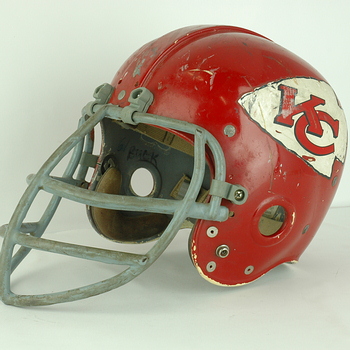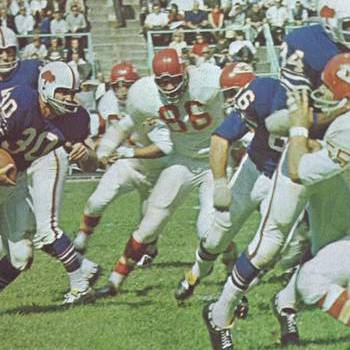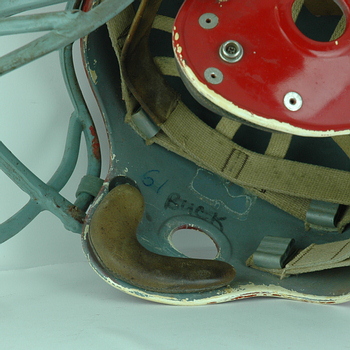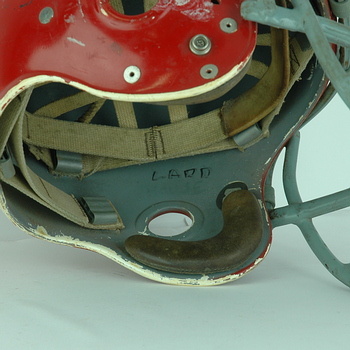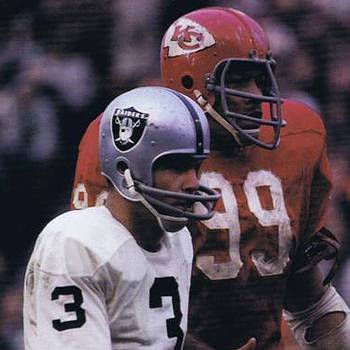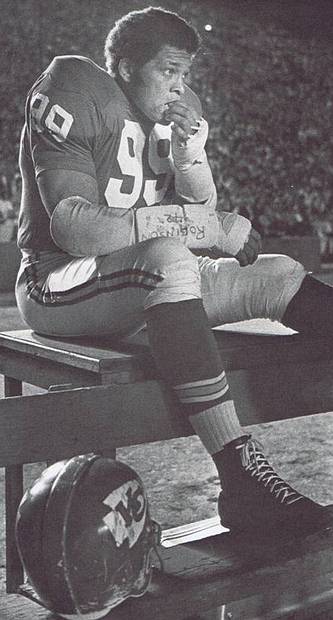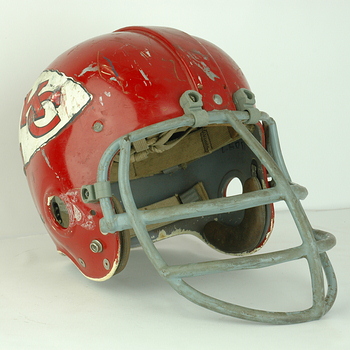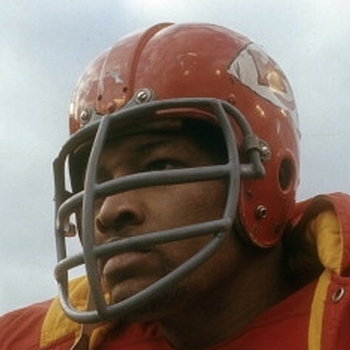
KC CHIEFS
One Great KC Helmet
Buchanan / Ladd
There are some football
helmets that are considered to be “great.” They could earn that superlative
for no reason other than the fact they were part of the official game
uniform of a player recognized as one of the game’s greats. Any helmet worn
onto the field by Johnny Unitas for example, would be considered a “great
helmet” and a “great find” if only because it was a possession of Johnny U.
Some helmets are “great” because they were worn in one of the significant or
meaningful games of the past, a Super Bowl, a momentous championship game
like the 1958 Colts versus Giants clash that altered our culture’s “take” on
professional football, or games that have been memorialized with names such
as “The Heidi Game” or “The Ice Bowl.” There are helmets that are from a
previous era of football that are well enough preserved that one can
identify the team, the type of mask that adorned it, and perhaps a select
few players that could have been assigned the specific headgear. When a
helmet is discovered and eventually authenticated that has a pedigree that
incorporates a number of the qualities that deem it as “great,” it is indeed
a wonderful piece of memorabilia.
A helmet and especially one from the 1950’s
and ‘60’s before safety standards evolved to their present state, was often
worn by numerous players, and utilized until the equipment staff decided
that it just would not hold up to another hard impact. Budgets were tight,
concerns for player protection were commensurate with the limited knowledge
of injury causation, and most suspension helmets from the high school
through professional football levels were handed down until structural
failure prevented further use. One of the recent “great” helmets
began its existence with the original
Dallas Texans franchise of the American Football League, and remained in
on-the-field use into the 1967 season. Having apparently been worn from 1961
through the team’s shift to Kansas City, during the very first Super Bowl
game, and by two players who hold significant stature in professional
football’s history certainly marks this in many ways, as an absolutely great
helmet.
Using inscriptions inside
the Riddell suspension helmet shell in conjunction with photographic
research has led experts to identify the users of this very helmet as Danny
House, Junious “Buck” Buchanan, Dennis Biodrowski, and Ernie Ladd. As a
twenty-sixth round choice in the 1961 player draft, unheralded Danny House
did not make the final cut for the regular season and thus for Texans or
Chiefs fans, remains little more than a name on a spreadsheet noting the
long list of collegiate players in that year’s draft process. However House
remains “a name” in Davidson College football history, a receiver and
halfback who was an integral contributor to the November 5, 1960 upset of a
vastly superior Virginia Tech team in a classic David versus Goliath sports
scenario. Any Kansas City Chiefs helmet with the inscription “Buck” written
on the inside of the shell could and arguably should refer to the Pro
Football Hall of Fame great defensive tackle Buck Buchanan.
The great Buck Buchanan, #86, dominates
the middle of the field, wearing the protection of a Cowcatcher style
facemask
The first selection of
the entire 1963 American Football League draft, Buchanan was a dominant “All
Everything” force. With his 6’7”, 270 pound athletic body aimed at opposing
offenses, he became an unforgettable leader on the Chiefs
mid-to-late-Sixties defenses, earning entry to the Pro Football Hall of
Fame.
The number “61” also
noted on the interior of the shell has been linked to offensive guard and
special teams contributor Dennis Biodrowski. Not as well recognized as so
many of the other KC Chiefs from the Super Bowl I years, Biodrowski was a
standout fullback and defensive end at William Wirt High School in Gary,
Indiana who became an important part of the “Northern Influx” of players
collected by Memphis State University head football coach Spook Murphy in
the late-1950’s.
Like Danny House,
Biodrowski, despite rostering and contributing to the Chiefs success from
1963 through ’67, remains little-known to most Chiefs fans yet still holds
the distinction at Memphis of being one of their all time greatest two-way
ends. Biodrowski adds to the helmet’s pedigree having worn it in Super Bowl
I against the Packers.
“Big Cat” Ladd wearing what has become
an historic example of Chiefs memorabilia
The helmet inscription
“Ladd” immediately identifies the final user of this historical item by
Ernie Ladd, the unforgettable San Diego Chargers, Houston Oilers, and Chiefs
defensive tackle so well remembered for his tremendous size, quickness, and
big play ability. Adding to his reputation as an intimidating player, Ladd’s
highly successful and visible professional wrestling career sealed his AFL
participation in a veneer of greatness among fans and his peers. Thus,
having been part of the uniforms of four talented players whose professional
abilities spanned the spectrum from greatness to lesser-light, this well
worn, well used, and well cherished piece of football history lasted as a
game worn item from at least training camp of 1961 through November 5, 1967
when a structural fracture forced the equipment staff to remove it from
service.
The Riddell RK Extra Large Husky shell
demonstrates holes drilled for the “Cowcatcher” style of facemask although
other masks, most notably Ladd’s, was also worn with this specific helmet.


